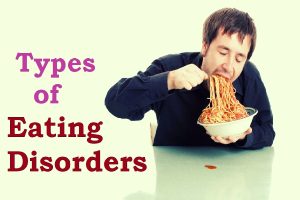Different types of eating disorders
There are a variety of eating disorders. Each having specific symptoms and behavior. The most commonly reported eating disorders include anorexia nervosa or bulimia nervosa. eating disorder that causes binge eating.
Anorexia is characterised by the fear of weight gain and a severe restriction on eating habits as well as a fervent desire to appear slim. Anorexics often have a an inaccurate view of their body shape and believe they are overweight, even though they are extremely thin. Anorexia can cause serious health issues, such as anemia, organ damage, or even the death.
Bulimia nervosa can be described as periods of excessive eating and then purging. People suffering from bulimia consume large quantities of food within short periods of time. They then purge themselves through vomiting or by using laxatives. The condition can cause serious health problems, such as electrolyte imbalances, dehydration and digestive issues.
Binge-eating disorder manifests as occasional episodes of overeating that are uncontrolled. The people who suffer from binge eating disorder consume huge amounts of food over short periods of time, and are unable to manage their food intake. The disorder of binge eating can cause weight gain and other health issues that are associated with being overweight.
If you believe that you or someone else you know could be suffering from an eating disorder, it is essential to seek help from a professional. The treatment for eating disorders is medical disorders that require the attention of a trained professional or therapist.
What causes eating disorders?
Alsana St Louis Disorders of eating are multifaceted and are often multi-cause. There isn’t a single reason for eating disorders. They are likely to result from a mix of biological, genetic as well as psychological and sociocultural elements.
Genetic factors could be a factor in eating disorders. The occurrence of eating disorders is common within families, which suggests that there is a genetic element to these disorders. It is crucial to keep in mind that not all who has a family experience of eating disorders is likely to develop one by themselves. Environment and other variables are also a factor.
Biochemical factors could be a factor in the developing that lead to eating disorders. There is evidence to suggest that certain brain chemical (neurotransmitters) might play a role in the control of food intake and appetite. Instabilities in these neurotransmitter networks can lead to erratic eating behaviors. Furthermore, hormones, particularly those that affect reproduction could play a part to contribute to the development of eating disorder. For instance, studies suggest that women who have more hormones Oestrogen are more at chance of developing bulimia nervosa.
Psychological factors are also believed to be a contributing factor to the development of eating disorders. Alsana St Louis MoThe self-esteem of those who are perfectionists might be more prone to developing an eating disorder since they turn to food and weight control to manage difficult emotions or circumstances. In addition, those who have suffered trauma or abuse are more likely to develop an eating disorder since they use diet restriction as a means to gain control over their weight.

The signs of an eating disorder
There are many indicators of an eating disorder and they can vary based on the kind of disorder. But, there are a few obvious signs that someone is suffering from an eating disorder. These include:
A fascination with weight, food, and body image
Rapid or extreme weight loss or increase in weight
Eating very small
Consuming large quantities of food over a short period of time
-Use vomiting to help or laxatives following a meal
Excessive exercise
Being extremely critical of one’s appearance
If you’re concerned that someone in your circle might be struggling with the disorder of eating, it’s essential to talk with the person concerned about their concerns and urge them to seek out professional assistance.
Treatment for eating disorders
The eating disorders are serious and possibly life-threatening mental disorders that must be dealt with by trained professionals. There isn’t a universal treatment for eating disorders however, there are a variety of proven treatment options which can assist people in recovering from the effects of these disorders.
The first step in treating is to typically ensure that the patient’s physical health is maintained. This can include the treatment of any medical issues and addressing nutritional deficiencies and assisting the person to attain and keep an ideal weight. After the physical health of the patient is stabilized it is possible to work to address the psychological and emotional components that cause their eating disorders.

CBT is a form of cognitive behavior therapy (CBT) is one form of psychotherapy which has been found that it is effective at treating disorders related to eating. CBT assists people in identifying and alter negative behaviors and thoughts that cause their condition. Other forms of psychotherapy, including interpersonal therapy (IPT) and dialectical behavior therapy (DBT) may also aid in the treatment of eating disorders.
The use of medication can also be utilized as a part of the treatment of eating disorders. Antidepressants, antipsychotics as well as mood stabilizers, are typically prescribed to treat some of the signs and symptoms associated with these diseases. In certain instances, other types of drugs may be suggested.
Counseling and education in nutrition is an crucial to treatments for disorders of eating. Dietitians with a registered dietitian can help individuals to help them develop good eating practices and deal with any problematic eating habits.
Support groups are a great way to
Conclusion
There are many treatment options for people who suffer from eating disorders. The most important thing to do is get help as quickly as you can in order to get started on the path towards recovery. If someone in your family or friends struggles to overcome an eating problem, seek help.





